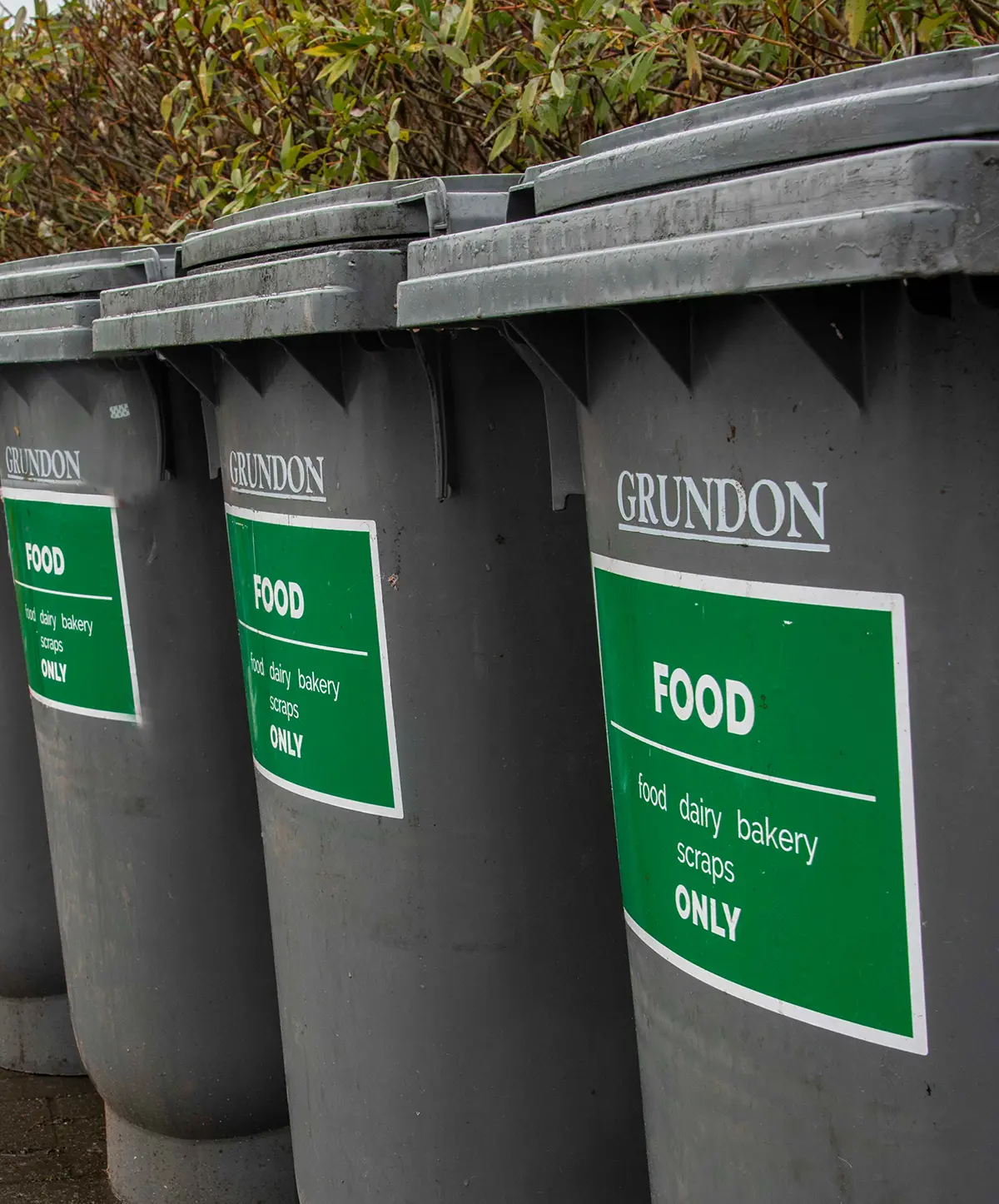Food waste collection and recycling
- Turn your food waste into energy and fertiliser
- Range of indoor caddies available
- Bin exchange service available
- Stay fully compliant
Are you compliant with food waste legislation?
Businesses with 10 or more full-time employees* must separate food waste from general waste, regardless of the amount produced. This is due to the Simpler Recycling legislation which came into effect on 31 March 2025.
Grundon work with businesses of all sizes and sectors to help manage their food waste effectively and send it for recycling.
From small offices to large hospitality companies including restaurants, hotels and food manufacturers, we have the containers and collections to suit.
*Businesses with fewer than 10 full-time employees have until 31 March 2027 to comply.
Turn your business’ food waste into energy and fertiliser
We can accept all your food waste in one bin, including:
- Tea bags and coffee grounds
- Plate scrapings
- Peelings and leftovers
- Cooked and raw
- Dairy
- Fruit and vegetables
- Meat, fish, bones and shells
- Bread and pastries
Once collected, we take your food waste to an Anaerobic Digestion (AD) facility. AD is a safe biological process in which food waste and other organic materials are broken down by micro-organisms in the absence of light and oxygen, to produce renewable energy and a nutrient-rich biofertiliser.
A range of kitchen caddies
Our range of indoor caddies offer a seamless solution for managing food waste within your business. With ease, their contents can be transferred to larger outdoor bins
100% diversion from landfill
By sending your food waste for recycling at Anaerobic Digestion facilities we can divert it from landfill
CarbonNeutral® collections
Our entire collection fleet is certified CarbonNeutral® – ensuring we don’t add to your carbon footprint
Less food wastage
Simple reporting helps identify where food waste can be reduced and provides valuable information for future menu planning and stock control
Trusted by over 15,000 businesses




We can help reduce the environmental impact of your food waste
All too often food waste is sent to landfill, a process that, because of its weight, will incur heavy penalties in Landfill Tax charges and does nothing to help attain the goal of zero waste to landfill.
There is also the problem that as food waste biodegrades, it releases harmful greenhouse gases, such as carbon dioxide and methane, which contribute to climate change.
Additionally, the cost of disposal will typically be up to two thirds more expensive than sending it for treatment at Anaerobic Digestion facilities.
That’s why introducing our dedicated food waste collection service can make a real difference to not only your carbon footprint, but your bottom line, too.
Tell us about your food waste and we’ll provide you with a bespoke quote
We’ll schedule your collections
Your business remains fully compliant and we provide you with regular reporting to keep up to date with your waste
Arrange your food waste collection with Grundon today
What can go in a food waste bin?
We accept most discarded and uneaten food, including:
- Tea bags and coffee grounds
- Plate scrapings
- Peelings and leftovers
- Cooked and raw
- Dairy
- Fruit and vegetables
- Meat, fish, bones and shells
- Bread and pastries
Can I just put food waste in my general waste bin instead?
No. As of 31 March 2025, all businesses and other non-household premises with 10 or more full-time employees must separate food waste from general waste, regardless of the amount produced.
Businesses with fewer than 10 full-time employees must have these collections in place by 31 March 2027.
Can I put compostables in my food waste bin?
No. If you regularly produce compostable waste, you should set up a separate collection. Grundon offer this service and you can find out more here.
If I only produce small volumes of food waste, do I really need a separate service?
Yes. To remain compliant with Simpler Recycling legislation, all businesses must separate food waste from general waste, regardless of volume.
Grundon can offer a variety of containers to suit your needs, along with a bespoke collection schedule, ensuring we only collect as often as you need.
What containers do you offer?
We supply a range of kitchen caddies for back-of-house, including 7L, 10L and 23L. Our specially-designed 120 litre bins are designed to fit neatly under-the-counter in food preparation areas, making them easier to manage than larger 240 litre bins.
They are perfectly suited to the job because they have rounded bottoms for easy cleaning, which means no liners or bin bags are required. Their clip-down sealed lids ensures no spillage and their lightweight design makes them easier to move around, reducing the potential for manual handling injuries.
We also offer a bin exchange service, which means whenever we take a full bin away, we replace it with a fully-sanitised clean bin ready to go straight back into your kitchen.
For larger volumes, we can provide compactors.
Some weeks I may need more collections. Can I amend my collection schedule?
We recognise some periods are busier than others for our hospitality and food processing customers, which is why our food waste collection service offers complete flexibility, allowing you to add extra collections whenever they are needed.

